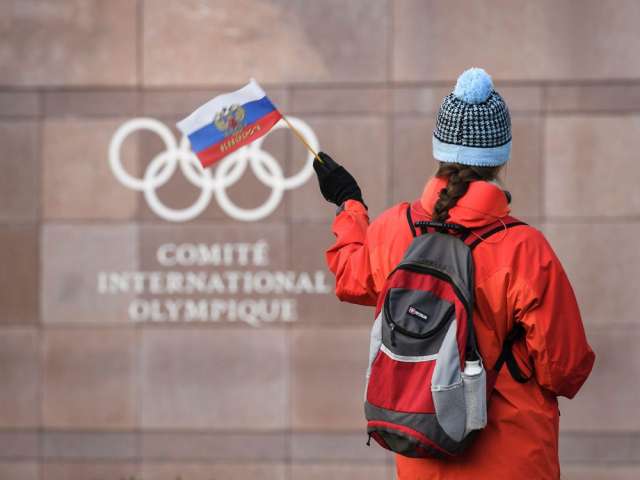Buzzer sounds on Russian doping deniers as IOC finally, actually does the right thing

Here is an extraordinarily rare statement that is nevertheless true: the International Olympic Committee has done the right thing.
In levelling unprecedented punishment on Russia for its state-wide doping scheme — banning the country’s Olympic committee from Pyeongchang 2018, prohibiting the use of its flag and anthem, and requiring verifiably clean Russian athletes to compete under a neutral flag — the international body, belatedly, responded in kind to what was an unprecedented scandal.
By now the particulars of the Russian program are well known: a system run through the sports ministry that turned anti-doping scientists into agents performing the opposite role, that identified potential medallists and protected them from scrutiny, and that reached its remarkable apex at Sochi 2014, where Russian police literally swapped urine samples in the dark of night through a secret hole in the wall.
IOC president Thomas Bach said on Tuesday in Lausanne, Switzerland, that the punishment was a “proportional” response given the “unprecedented attack on the integrity of the Olympic Games,” which is correct. The breadth of Russia’s corruption of its anti-doping programs meant that no Russian athlete could be trusted to be clean, since one of the scheme’s main pillars was the “disappearance” of positive drug-test results.
There will be complaints from Moscow, no doubt, in the coming weeks about the IOC ban being unfair, about it being part of a Western conspiracy to undermine Russia’s restored standing in the world under the leadership of President Vladimir Putin, but this line of argument neatly avoids the fact that Russia has had years — seriously, multiple years — to co-operate with investigating anti-drug officials and provide the exculpatory evidence that would surely exist if this was some kind of U.S.-led scam.
A woman waves a Russian flag in front of International Olympic Committee headquarters in Lausanne, Switzerland, on Dec. 5.
Not long after the first details of the Russian doping program were revealed in a German television documentary in 2014, the World Anti-Doping Agency launched an investigation into its many allegations. (Richard Pound led that commission and Richard McLaren, a fellow Canadian, was one of the members.) That probe was instructive in the way in which Russia chose to respond to the revelations, which is to say they chose not to respond at all. As investigators and doping-control officers fanned out across Russia to try to get to the truth of the allegations, they were met with an almost universal refusal to co-operate.
WADA’s first independent commission report, published in late 2015, described how doping-control officers would arrive at a hotel that was known to be a base for a training camp and were told that there were no athletes present, even after the front desk had confirmed their names. In one case, a resourceful official hung around the lobby and looked up headshots on his phone and then used them to identify certain athletes. Over and over, Russian athletes told WADA officials that, after the German documentary aired, they were instructed to cease all cooperation with drug-testing officers.
Russia adopted the practice of a blanket denial, and kept that up for more than two years, and through subsequent revelations, both in the media and in the months-long investigations ultimately carried out by McLaren at WADA’s behest. It worked for quite some time, through Rio 2016, when the IOC refused a total ban and said it needed more time to consider the conclusion of the WADA probes.
Other than the many expressions of shock and disgust that have been uttered about the Russian program, one of the money quotes of this story remains the one uttered by McLaren at his Toronto news conference in the spring of 2016, when he was asked why he hadn’t sought more Russian co-operation with his work. We tried that already, he said: “We found that process singularly unhelpful.”
Russia has effectively ragged the puck for more than 24 months now, but the buzzer eventually sounded.
The unexpected part of the IOC’s decision is that, as much as it deals a tremendous blow to Russia, preventing it from winning medals in Pyeongchang and promising to reallocate those that it won in Sochi, it is also a massive blow to the Olympics themselves. Russia, and the former Soviet Union, have been one of the biggest Olympic powers, both in terms of the size of their delegation and in the number of medals they typically win. Removing them from Pyeongchang makes them an instantly smaller Games, as the neutral-flag contingent is bound to be relatively small.
Beyond that, the unfortunate lesson of Russia’s grand scheme is that anti-drug efforts are likely doomed to be playing from behind. Russia’s state-directed program worked beautifully — no country had more athletes on podiums in Sochi — and were only discovered when whistleblowers came forward. Even then, it took years for sanctions to be brought down, and in the meantime the Rio games came and went.
The path for a country inclined to duplicate those accomplishments is clear: develop a doping program, and deny everything if caught.
Oh, and be wary of whistleblowers. That’s likely the biggest regret Russia has, after all this.
• Email: sstinson@postmedia.com | Twitter: @scott_stinson





